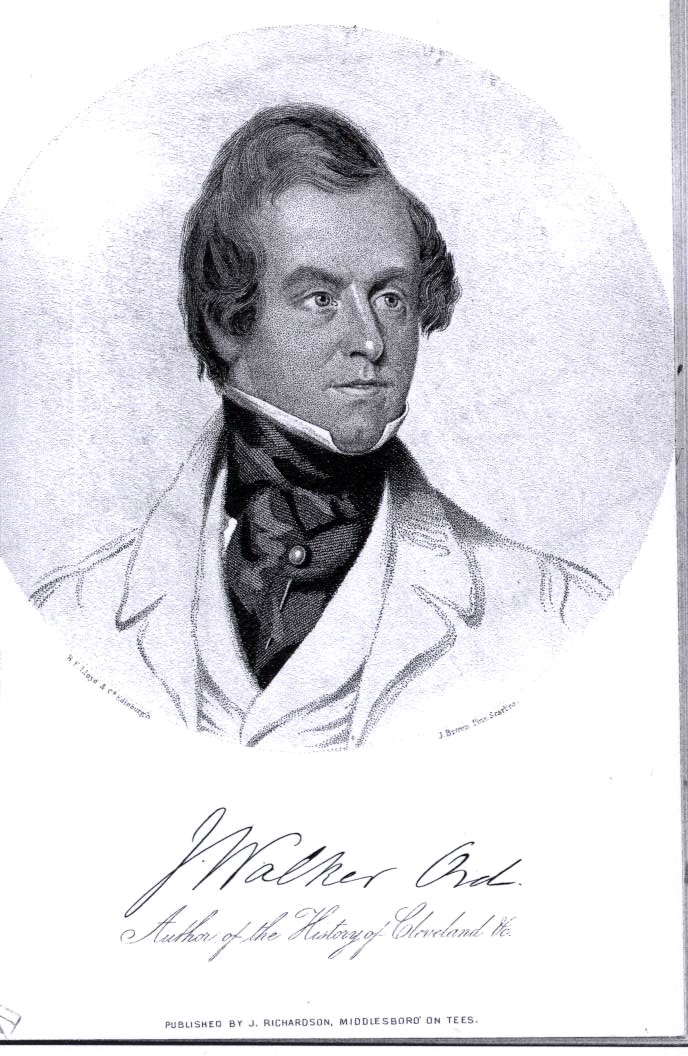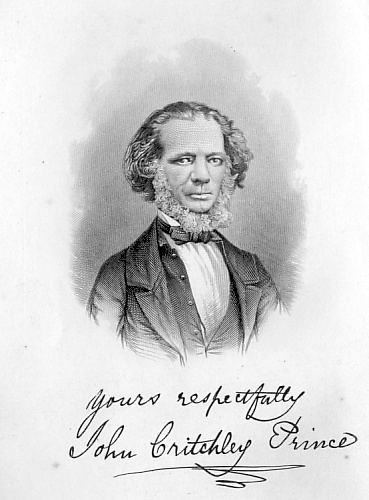Sunnyside Gill
A Blank Verse Poem
Addressed to Mr Henry Wade, Master of the Grammar School of
Wolsingham; author of “Halcyon, or Rod Fishing in Clear Waters,”
“Country Lyrics, and other poems,” &c.
Thanks, angler-poet-artist, thanks to thee
For the neat sketch which thou to me hast sent
Of one of Nature’s lovely hidden nooks.
Oh, it is well for those who have such scenes
Within the usual limits of their walks, 5
And eyes to gaze on them with fervent love:
For he who loveth Nature in his soul,
Will ne’er repent it through the longest life,
Or when kind Death strikes off his mortal gyves.
Those ancient rocks, (o’er which the Lichen stole, 10
With silent footsteps and in beauty robed,
Myriads of ages ere a loving eye,
Like thine or mine, beheld them,) have not they
A history to unfold, compared to which
Those sad sensations of mad novelists 15
Are tame and unromantic? Yon waterfall,
Gushing in liquid melodies sublime
In its unceasing hymnings, is to me
A celestial organ, ever tuned
To angels’ songs; and I can hear it swell 20
With harmony unutterably sweet,
Though all the darkest chambers of my soul:
For dear to me is ev’ry watery sound;
From gently trickling of the newborn streams
Through mountain mosses; or the gleesome march 25

Of gathering rivulets through primrosed meads;
To rushing roar of mighty cataracts;
Or billows dashing madly ‘gainst the cliffs
Of my dear Cleveland coast;—all these to me
Are full of music and of beauty too. 30
The stunted Oak, that strives to grow above
Thy rocky waterfall, oh Sunnyside!
But’s dwarf’d for want of genial soil in which
To spread its roots, reminds me of my race—
Those more than “hearts of oak”—who might have been 35
Expanded like the goodliest forest tree
In beauty and in joy; yea, might have been
The strength and power for good in this our realm,
Had education of the truest kind
Taught them to use their faculties aright: 40
Had fostered care developed the rich minds
Or more than gold or diamonds which lie hid
In human souls: but who are stunted now—
Dwarf’d to deformity—for lack of soil
In which the roots of true nobility 45
In man or woman may find nutriment.
’T is to cultivate each yard of soil
For corn, and fruits, and flowers: it is well
To probe the earth for minerals that may
Be fused to human use; but it is vain 50
To prate of “wealth of nations” in our pride—
Yea, bloated ignorance—if we despise,
Neglect, or scorn, the meanest child that’s born
Of meanest parents; for there is a wealth
To be developed by all nations yet 55
In those bright rays all other wealth will pale.
As the sun’s beams upon the Alders shine
That this Gill adorn, causing healthy sap,
The life’s-blood of the trees, to circulate
Through all their woody veins; their leaves to breathe 60
The breath of heaven, unpolluted here:
Until they sport that livery of green
The poet loves to look on:—so in time
The sun of knowledge (hidden by the clouds)
Of densest ignorance from the mighty mass 65
Of moiling millions, who know not yet
The godlike power within them) will forth
Brighter than in the days of ancient Greece,
Even to here favour’d few.
Ye Alders,
Growing by this peaceful stream, which, as yet, 70
Is unpolluted by the poison drain’d
From neighb’ring leadmines, may your ashes* ne’er
Aid in the murd’rous warfare which vile nab
Wages with brother man. Accursed War!
Back to the native hell! Each scene like this
Protest against thee. He Who form’d such nooks 75
Of peaceful loveliness, ne’er meant that we
Should e’er indulge in fratricidal strife.
Ye, Alders, flourish by the purest streams,
But perish in the stagnant pool: so we
Should learn from you only to imbibe 80
The unpolluted waters which the soul
Can drink and be refresh’d with; leaving all
The stagnant sinks that wither up the roots
Of all true greatest in the mind of man.
So God has writ, for all who choose to learn, 85
Lessons of wisdom in each thing we see;
Alas! we heed them not, but buzz along,
Like simple insects, down the maze of life,
Scarcely wiser at its close than we began.
Hail, stately Foxgloves! in your purple pride, 90
How you all pamper’d princes far outshine!
They may don “imperial purple”; they may
Have flunkey fools to feed them, and to wait
Obsequious at their call: while slaves around
To do their bidding, though that bidding’s vile,— 95
As princes’ biddings have been through all time,
With some so few exceptions that we stare
With wonder when an Albert Good appears.
They may deck their impious foreheads with fine
Golden crowns; priests, false to Christ, persuade them 100
That they are fashion’d by superior clay
* With the exception of charcoal made from burning the wood of the
Black Dogwood (Rhamus frangula), that of the common Alder (Alnus
glutinosa) is the most esteemed for the manufacture of gunpowder.
To those who batten on; and strive also
To gain them worship which belongs alone
To Him Who form’d us for much nobler ends
Than to bow down to either priest or king; 105
Though all the dev’lish instruments of War
Surround their blood-built thrones; ye, Foxgloves tall!
Will wear the purple with imperial pride,
In strict succession, on your peaceful thrones,
When theirs have passed away.
Ye Daisies dear! 110
How shall I do you justice? Chaucer’s self
Could but admire you and express his love;
And I love him more for loving you.
Oh, may my life, in action, word, and thought,
Be pure as your fair petals!—ev’ry one 115
A perfect flower. Gallant knights of old,
As emblems of fidelity, have worn
Daisies with their love-tokens, in the tilts
And tournaments of those days when Chivalry
Was soft’ning down the barb’rism of the times; 120
And their fair ladies worn them in their hair.
What other flowers have such fidelity?
In winter we have seen the Daisy bloom,
When other flowers had left the mountain side
And the green lanes and pastures desolate, 125
Ere Wordworth’s flower, “the little Celandine,”
Has shown its golden petals; and when those
Of the bright Buttercup have paled in death,
“Thy snawie bosom sunward spread” is seen
Unflinching in fidelity: and Burns, 130
The truest bard of Scotland’s tuneful band,
Loved the “wee, modest, crimson-tipped flower,”
With holy fervour; and in Montgomery’s verse
“The Daisy never dies.” And if a poet
With less gift of song; if a bard who soars
Much nearer earth, but still looks up in heaven; 135
May, at an humble distance, follow them,—
I love the Daisy with that fervent love
I kiss’d it when a child; and on my grave,
Though other flowers be none, I’d have it there,
And the sweet lark to carol overhead. 140
Flow on, sweet streamlet, through this pleasant Gill,
Of Sunnyside well known. Methinks I see
The beauteous spotted trout rise in yon pool
At HALCYON’s well-thrown fly. In such a spot,
With hum of insects and with songs of birds.
Mingling with music of the purling brook,
Who would not be an angler? Byron’s self
Here would grasp Izaak Walton by the hand,
And bid him angle on and contemplate.
On, little stream, to join the wooded Wear, 150
Gurgling along its pebbled bed in pride,
Past many pleasant and historic sites,
Gathering rill by rill, and brook by brook,
Until its lordly bosom well can bear
The largest argosies, to help to bind 155
All nations in the peaceful bonds of trade
And commerce; and the ocean shall become
The common highway of all nations,—not
Their naval battle-scene: for man with man
Must learn to war no more, and humankind 160
Prove by their acts the brotherhood of man.
Such are the vagrant thoughts, my HALCYON dear,
Thy bonny sketch calls up within my brain.
I’ll look upon this picture when I am
Debarr’d from rambling in such rustic spots, 165
And fancy I am there. Some day I hope
To seat me for a daydream on yon stone,
Whilst thou shalt angle near; and we will talk
Of Nature and of Poësy divine,
And fancy Walton and his Cotton there. 170
Meanwhile accept my thanks for having sent
Thy watercolour drawing, which has made
Me know another lovely nook o’ the North
Unknown to me before. Let those who will
Wander around the world in search of that 175
They have so near, if they would look for it;
Be it mine to explore, and patriotic love,
The many glorious scenes we have at home.
Stokesley George Markham Tweddell
Lines 47 to 56 above are also quoted in Cursory Remarks on
Education and School Board Elections, North of England
Tractates, No. 30 (1887)
Halcyon: Or, Rod-fishing with Fly, Minnow, and Worm
By Henry Wade
http://books.google.co.uk/books?id=mXkoAAAAYAAJ&printsec=frontcover&source=gbs_ge_summary_r&cad=0#v=onepage&q&f=false








